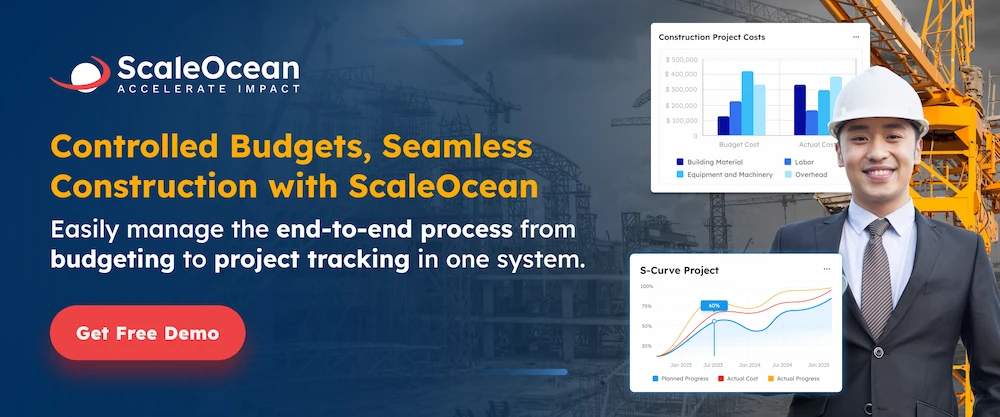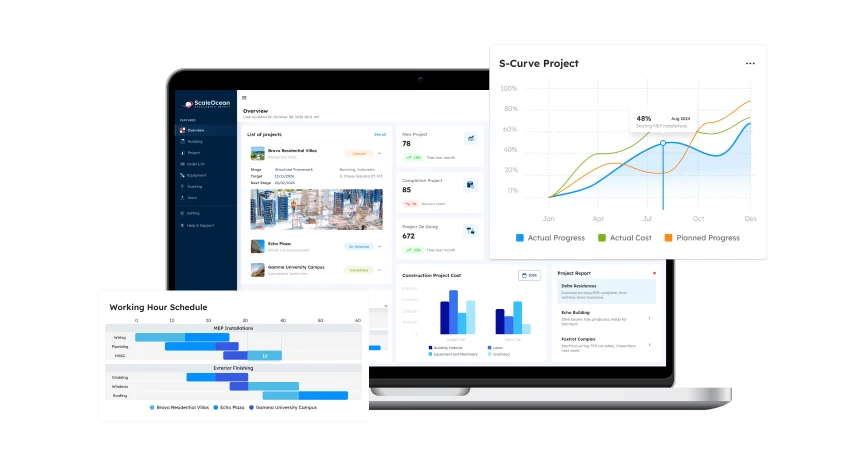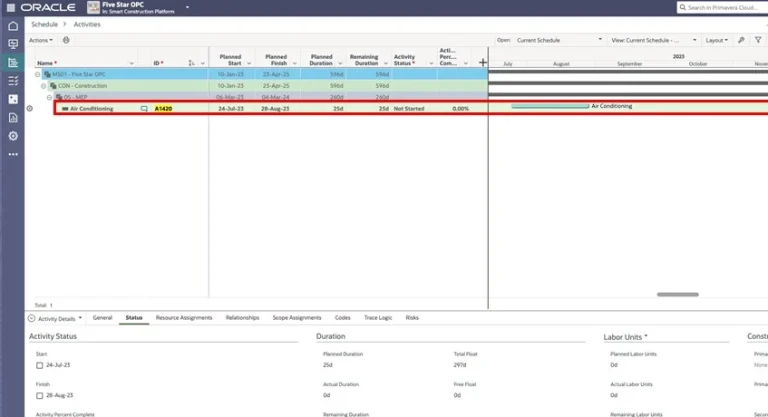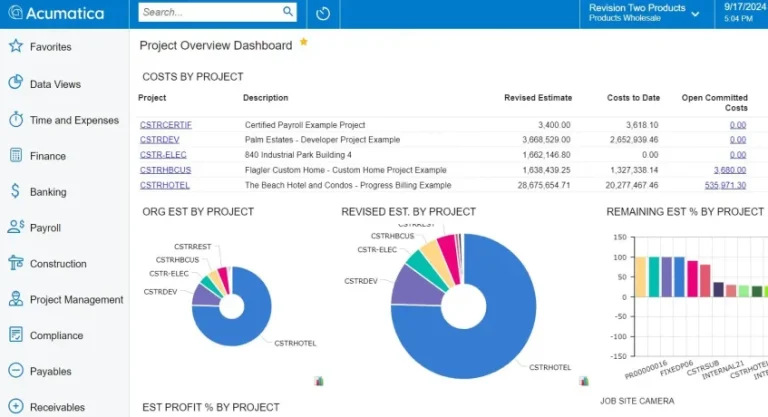Optimizing a successful construction project relies not only on technical skills and the right resources, but also on efficient management. To optimize various processes, it is crucial to implement appropriate and suitable ERP software for construction companies.
Many problems can arise if a construction company does not use ERP software, ranging from unintegrated project management, numerous errors in construction procurement, to difficulties in monitoring project budgets and costs.
The use of this software must also be appropriate and appropriate to your construction company’s needs. Therefore, this article will outline 12 recommended ERP software for construction companies, as well as the various ERP software modules and how to choose them.
- Construction ERP software is a tailored system that streamlines business operations in the construction industry to optimize project and business operations.
- The benefits of construction ERP software are increased efficiency, financial control, enhanced collaboration, better compliance, centralized project management, and automated procurement.
- Features and modules ERP for construction companies: tender and bid management, contract management, construction accounting, workforce management, compliance, and risk management.
- The best construction ERP software includes: ScaleOcean, SAP S/4HANA, Procore, Viewpoint Vista, Sage 300 CRE, Microsoft Dynamics 365, Oracle, and others
- ScaleOcean is the best construction ERP recommendation with automation, integration, and full visibility of all business processes and projects in a construction company.

What is Construction ERP Software
Construction ERP software is a tailored system that streamlines business operations in the construction industry to optimize project and business operations. An ERP system for a construction company can centralize data for functions such as job costing, financial accounting, project management, procurement, also human resources.
Implementing ERP software for construction companies is a crucial solution, especially in optimizing processes and costs for construction projects. This system can also enable construction companies to manage costs, resources, and schedules efficiently across various projects and locations.
According to Future Market Insight, the use of ERP software in construction companies can contribute to increasing construction projects by around 3.9% and achieve a market share of around 5.2%, reflecting increased reliance on integrated platforms.
From a market survey regarding the use of construction ERP software, its use is the best solution for optimizing construction business processes in a comprehensive and integrated manner.
Key Benefits of Construction ERP Software
Implementing a construction ERP system offers numerous advantages that can transform how construction companies manage their operations. From improving efficiency to enhancing decision-making, ERP systems provide the tools needed to streamline processes, reduce costs, and ensure project success.
Here’s a closer look at the key benefits that construction companies can gain by adopting this technology.
1. Increased Efficiency and Productivity
Construction ERP automates manual tasks, reducing redundant data entry and eliminating information silos. By streamlining operations, teams can focus on high-priority tasks, improving overall efficiency and productivity across departments.
This automation from implementing a construction ERP system can lead to faster project execution, optimized resource allocation, and a significant reduction in time-consuming manual work.
2. Improved Financial and Budgeting Control
A construction ERP system provides real-time insights into project costs and cash flow, enabling construction firms to track spending as it occurs. This transparency allows for early identification of budget overruns, making it easier to adjust and control financials.
With better oversight, companies can maximize profit margins and avoid unexpected costs that can hinder project profitability.
3. Enhanced Collaboration
ERP systems centralize data and facilitate communication across all project stakeholders. With everyone working from a single source of truth, coordination between the back office and field teams improves significantly. This reduces errors, enhances decision-making, and ensures that all teams are aligned with project goals, timelines, and budgets.
4. Better Compliance and Risk Management
Construction ERP systems improve risk management by streamlining compliance tracking and creating comprehensive audit trails. This helps firms stay on top of regulatory requirements, reducing the chances of legal issues, safety, fines, and costly mistakes.
With ERP for construction companies in Singapore, businesses can proactively manage risk factors, ensuring compliance and protecting the company’s reputation.
5. Scalability
As construction firms grow, ERP systems facilitate seamless expansion by standardizing processes and procedures across various projects, locations, and business divisions. This scalability allows companies to efficiently manage larger teams, more projects, and broader geographic operations without sacrificing quality or efficiency.
6. Data-Driven Decision Making
ERP systems offer rich analytics and historical data, which enhance decision-making and forecasting accuracy. By leveraging data-driven insights, construction firms can make more informed strategic decisions, from bidding on new projects to managing resources effectively.
7. Centralized Project Management
Construction ERP software centralizes all project-related data, ensuring seamless coordination among teams. By bringing together project schedules, budgets, and tasks into one platform, it reduces the risk of miscommunication and improves overall workflow efficiency, making it easier for all departments to stay aligned and on track.
8. Automated Procurement and Inventory Management
ERP software streamlines the construction procurement process by automating material orders and inventory tracking. It helps maintain optimal stock levels, avoiding both shortages and overstocking. This reduces waste, prevents costly delays, and ensures that materials are available when needed, keeping projects on schedule.
9. Workforce and Resource Allocation
With ERP, construction companies can optimize labor schedules and track resource utilization. This software ensures that the right personnel and equipment are assigned to the right tasks at the right time, boosting productivity and minimizing downtime, leading to more efficient project execution.
10. Improved Analytics and Reporting
The best construction ERP software offers advanced reporting features that provide detailed insights into key performance indicators (KPIs). With these analytics, companies can assess project performance, make data-driven decisions, and refine strategies for future projects, leading to improved outcomes and efficiency.
Features and Modules of ERP for Construction Companies in Singapore
In Singapore’s dynamic construction landscape, adopting an ERP tailored for the industry is essential for streamlining operations, ensuring compliance, and enhancing project outcomes. The right ERP solution integrates various functions, providing a cohesive platform to manage complex construction processes efficiently.
Here are key features and ERP modules for construction companies in Singapore, including:
1. Tender and Bid Management
Tender and bid management in modules in the ERP construction streamlines the process of responding to tenders and managing bids for the construction process.
Construction ERP for construction companies facilitates the organization and automation of the submission of bids, ensuring that all necessary documents and proposals are accurate and submitted on time.
It helps in evaluating project feasibility, assessing risk factors, and leveraging historical data to make competitive and profitable bids. Additionally, it improves collaboration among team members, ensuring that all stakeholders are aligned with the bid strategy, ultimately enhancing the chances of winning contracts.
This detail of the tender and bid module:
- Function: Assists in the tendering procedure by enabling construction firms to develop, oversee, and monitor bids, proposals, and interactions with vendors.
- Features: Provides resources for developing and overseeing tender documents, comparing vendors, automated notifications for due dates, and maintaining audit trails.
- Benefit: Boosts competitiveness by guaranteeing prompt and precise proposals, and minimizes manual labor in monitoring submissions.
2. Payroll
The payroll modules simplify managing construction payroll by automating processes and accurately calculating wages, deductions, and overtime. This payroll software ensures compliance with labor laws, reconciles data seamlessly, and eliminates manual errors, making payroll management efficient and error-free for growing businesses.
- Function: ensures timely and accurate salary payments for employees by automating the payroll process.
- Features: Include employee self-service portal, tax filing, compliance reporting, payroll computations, HR system integration, and mobile access.
- Benefit: saves time, lowers payroll processing errors, guarantees local law compliance, and gives workers instant access to their pay information.
3. Contract Management
The contract management modules in ERP systems assist construction companies in managing contracts more effectively throughout the project lifecycle. This module stores all contract management-related information in a central repository, making it easily accessible to all relevant parties.
The best construction ERP software can help automate and manage tasks related to contract creation, execution, and analysis, ensuring compliance with the terms and conditions agreed upon. This ERP module for construction companies provides tools for monitoring contract performance, facilitating timely adjustments as necessary.
- Function: Assists in overseeing contracts from start to finish, making sure all requirements are fulfilled.
- Features: Include real-time status tracking, electronic signature integration, contract creation templates, automated milestone reminders, and document storage for convenient access.
- Benefit: Improves contract compliance, reduces risks of legal issues, and helps ensure that all obligations are fulfilled on time.
4. Construction Accounting
Construction accounting is a specialized solution that combines core ledgers with industry-specific construction accounting and reporting requirements, tailored for the building sector.
By leveraging the best construction ERP software, businesses can manage centralized data, optimize financial processes, and meet the unique demands of construction accounting efficiently.
Construction ERP can help construction companies maintain financial control across multiple projects by monitoring costs, revenues, and profitability in detail.
Additionally, it enables managers to make well-informed decisions, maximize cash flow, and guarantee financial stability throughout building projects by offering a clear perspective of financial data, especially for the general ledger.
- Function: Simplifies financial processes, such as financial reporting, forecasting, budgeting, and accounting.
- Features: Includes cost control, cash flow management, reporting, and budgeting.
- Benefit: Assists construction companies with risk mitigation, compliance assurance, and financial performance tracking.
5. Workforce Management
Workforce management construction is a vital module in the construction system that integrates with various operations such as task management, time tracking, and material allocation.
This module helps manage human resources for your construction workforce, ensuring compliance by automating time collection and other essential functions, all within a unified workforce management system.
Construction companies in Singapore may enhance project execution and overall cost savings by allocating their personnel more effectively, cutting down on idle time, and making sure that skilled labor is used effectively with real-time analytics.
- Function: Oversees scheduling, timekeeping, and payroll for the construction workforce.
- Features: contains payroll processing, time and material management, and task management.
- Benefit: Increases worker productivity, lowers labor expenses, and guarantees adherence to labor regulations.
6. Business Intelligence
Business intelligence leverages business analytics tools to extract meaningful insights, helping construction companies measure and analyze performance. By integrating business analytics into ERP software, businesses can monitor KPIs, track indicators, and make data-driven decisions for improved business outcomes.
Businesses can estimate budgets, identify hazards, and enhance operational planning with predictive analytics. BI dashboards help construction managers track performance, compare past projects, and adapt strategy accordingly.
- Function: Gives construction companies useful information by examining data from several modules, such as project management, workforce, and finance.
- Features: Include Key performance indicators (KPIs), dashboards, reports that can be customized, predictive analytics, and integration with financial and project data.
- Benefit: Gives businesses a competitive edge in project planning and resource allocation by improving decision-making with actionable insights, increasing operational efficiency, and enabling better forecasting.
7. Compliance Management
Compliance management is an ERP module for construction companies to help organizations adhere to industry regulations, standards, and laws, which is critical to maintaining operational integrity.
By leveraging compliance management tools, companies can streamline the process of meeting complex regulatory demands, comply with construction site safety in Singapore, reduce the likelihood of violations, and ensure continued compliance with industry norms.
- Function: Reduces legal risks and preserves certifications by making sure construction projects follow all applicable laws, regulations, and safety standards.
- Features: Include regulatory checklist, audit trails, compliance monitoring, automated inspection reminders, and safety and legal compliance reports.
- Benefit: Reduces the risk of fines or legal issues, ensures project safety, and maintains the company’s reputation for compliance.
8. Reporting Construction
Reporting in construction management ERP software provides essential information clearly and succinctly, improving the decision-making process. Through real-time, detailed reports, the reporting module assists your construction business in meeting urgent requirements and optimizing the decision-making workflow.
- Function: Provides powerful reporting capabilities for monitoring and summarizing resource allocation, financial health, and project status.
- Features: Include financial reporting, resource utilization, cost tracking, project progress tracking, and customizable reporting templates.
- Benefit: Enhances visibility into project performance, facilitates better communication with stakeholders, and also supports informed decision-making by providing real-time data and analysis.
9. Risk Management
Risk management consists of recognizing, assessing, and ranking risks, and then mitigating and managing their effects.
By utilizing the best construction ERP software in Singapore, risk management is improved through ongoing project oversight, immediate notifications, and automated compliance monitoring, guaranteeing effective risk management across all phases of the project.
- Function: Identify, evaluate, and mitigate potential risks associated with construction projects, such as financial, legal, and operational risks.
- Features: Provide risk assessment tools, risk registers, mitigation strategies, scenario modeling, and integration with project management systems.
- Benefit: This module helps minimize the likelihood of costly delays or accidents, ensures proactive risk mitigation, and helps keep projects on track.
10. Workflow Management
The workflow management modules in the construction ERP system are crucial for optimizing processes and managing different approval workflows efficiently, particularly in the construction sector.
By incorporating workflow management into the best construction ERP software, companies can more effectively address legal obligations and facilitate seamless project execution, minimizing delays and enhancing overall productivity.
- Function: Ensures that tasks are finished on schedule and in the correct order by automating and streamlining the workflows of construction project management, from task assignments to approvals.
- Features: Workflows for approval, task automation, integration with additional project management software, and real-time task progress updates.
- Benefit: Cuts down on manual task handling, minimizes delays, and guarantees that every project step is carried out according to plan, all of which improve productivity and project timelines.
11. Contractor Management
Module construction ERP system contractor management is crucial for effectively supervising extensive teams and coordinating with subcontractors on construction projects.
ERP systems that incorporate contractor and construction asset management functionalities facilitate smoother operations, allowing contractors to adhere to project timelines while efficiently handling subcontractors and project activities.
- Function: Oversees subcontractor relationships, making sure that contractors fulfill performance standards, adhere to agreements, and deliver high-quality work.
- Features: Include monitoring subcontractors, assessing their performance, scheduling payments, adhering to contracts, and integrating with financial modules to facilitate smooth payment processing.
- Benefit: Improves project results, guarantees that quality standards are fulfilled, and increases contractor dependability by upholding productive contractor relationships and explicit performance expectations.
12. Document Management
Document management construction ERP system is an essential component of ERP for dealing with the large quantity of paperwork produced by construction projects, such as contracts, specifications, and drawings.
By utilizing a centralized document management system within ERP software, construction firms can effortlessly retrieve critical project documents, enhancing efficiency and facilitating seamless project implementation.
- Function: Centrally stores and oversees all project-related paperwork, such as permits, drawings, and contracts.
- Features: It includes a systematic and safe way to store and retrieve documents.
- Benefit: Promotes cooperation, lowers mistakes, and guarantees adherence to rules.
12 The Best Construction ERP Software
In Singapore’s competitive construction sector, selecting the right ERP software is crucial for streamlining operations, enhancing collaboration, and ensuring project success. The following list highlights the 12 best ERP software for construction companies, each offering unique features to meet diverse business needs.
1. ScaleOcean
ScaleOcean’s Construction ERP Software Singapore offers an integrated solution for efficiently managing construction projects. With a system that enables centralized tender and project management, real-time budget tracking, and automated material procurement, companies can avoid delays and unexpected costs.
The system provides full visibility into project status, streamlines resource management, and automates contract management and financial reporting. Furthermore, this ERP facilitates collaboration between teams, improves inventory management, and provides seamless integration with other existing systems.
Supported by organized payment and expense management, ScaleOcean’s ERP for construction companies can also enhance transparency, efficiency, and control over all aspects of construction project operations.
Scaleocean is suitable for use in medium to enterprise companies, with special configurations according to the company’s needs. To experience this solution, you can request a free demo and consult with Scaleocean’s leading team to find a customized solution specific to your construction project.
Key Features:
- All-in-one solution: over 200 modules and 1,000+ features tailored to specific business needs, supporting integration and flexibility.
- Customizable to meet the company’s demanding needs, including personalized dashboards and intelligent configurations for each division.
- Enjoy the seamless integration with all business functions within your construction company, as well as monitoring in a single, easy-to-use and configurable dashboard, from financial management and project management to warehouse inventory, procurement, and human resources.
- Facilitate collaboration between teams involved in a project by ensuring that the latest project information is accessible to all relevant team members in real-time.
With a focus on automation, integration, and full visibility into project operations, ScaleOcean’s Construction ERP helps construction companies manage their projects more efficiently, reduce risk, and increase profitability. Here are the pros and cons of ScaleOcean’s construction ERP software, including:
| Pros | Cons |
|---|---|
|
|
2. SAP S/4HANA
SAP S/4HANA is an enterprise-level ERP solution that offers powerful capabilities for financial management, supply chain optimization, and project management. This system leverages real-time data processing to enhance business decision-making.
This system can also offer flexibility to manage complex construction projects across multiple locations.
Key Features:
- Real-time analytics
- Comprehensive financial management
- Supply chain optimization
- Cloud and on-premise deployment options
| Pros | Cons |
|---|---|
|
|
3. Procore
Procore is a cloud-based construction ERP system designed to streamline project management and enhance collaboration within the construction industry. It offers modules for managing project schedules, budgets, contracts, and construction documents.
This software focuses on improving communication and operational efficiency while reducing risks associated with construction project delays.
Key Features:
- Project management
- Document control
- Budgeting and financials
- Quality and safety modules
- Mobile accessibility
| Pros | Cons |
|---|---|
|
|
4. Viewpoint Vista
Viewpoint Vista is an integrated ERP software specifically designed for the construction industry. It offers comprehensive modules for project management, accounting, job costing, and human resources. Viewpoint Vista is ideal for both large and small construction businesses.
Key Features:
- Job costing
- Project management
- Document management
- Mobile access
- Business intelligence
| Pros | Cons |
|---|---|
|
|
5. Sage 300 CRE
Sage 300 Construction and Real Estate (CRE) is a robust ERP solution designed for construction businesses to manage financials, projects, and operations. This software provides tools for job costing, project management, and real estate management, offering construction companies full control over their operations.
Key Features:
- Job costing
- Project management
- Document control
- Service management
- Payroll integration
| Pros | Cons |
|---|---|
|
|
6. Microsoft Dynamics 365
Microsoft Dynamics 365 is a comprehensive ERP solution that integrates finance, operations, project management, and customer relationship management for the construction industry.
This system can also help construction firms optimize operations, predict future project needs, and enhance collaboration across teams, ensuring timely project delivery and budget adherence.
Key Features:
- Project management
- Financial management
- Supply chain management
- Human resources
- AI and analytics
| Pros | Cons |
|---|---|
|
|
7. Oracle NetSuite
Oracle NetSuite is a cloud-based ERP platform that provides an integrated approach to managing operations, from procurement to project delivery.
Oracle NetSuite’s scalability allows it to support large construction firms with complex projects. With its real-time data access and automated processes, it helps companies manage costs, timelines, and resources more effectively.
Key Features:
- Financial management
- CRM
- E-commerce
- Supply chain management
- Real-time analytics
| Pros | Cons |
|---|---|
|
|
8. CMiC
CMiC is a comprehensive construction ERP software designed to optimize project and financial management within the construction industry. CMiC enhances collaboration by providing a centralized data repository that is accessible across departments.
This ERP for construction companies simplifies complex workflows, enabling construction companies to reduce operational costs and improve project performance, from preconstruction to project closeout.
Key Features:
- Project management
- Financial management
- Document control
- Human resources
- Mobile access
| Pros | Cons |
|---|---|
|
|
9. Deltek
Deltek is an ERP solution designed for project-based businesses, particularly in the construction, engineering, and architecture sectors. The software includes robust features for project management, financial accounting, and resource planning.
By offering deep integration with accounting and project management workflows, Deltek ensures that construction companies can handle large-scale projects efficiently and profitably.
Key Features:
- Project management
- Financial management
- Resource planning
- Time and expense tracking
- Business intelligence
| Pros | Cons |
|---|---|
|
|
10. Acumatica
Acumatica is a cloud-based ERP solution with a strong emphasis on project management and financial management for the construction industry. It offers modules for job costing, project accounting, inventory, and procurement, all integrated into a single platform.
Its scalability supports both small and large construction firms with a wide range of project sizes and complexities.
Key Features:
- Financial management
- Project accounting
- CRM
- Inventory management
- Mobile access
| Pros | Cons |
|---|---|
|
|
11. IFS Applications
IFS Applications is an ERP solution that offers comprehensive functionality for construction businesses, including project management, financials, asset management, and supply chain management.
It helps construction companies manage the entire project lifecycle, from planning to execution. This flexible and scalable ERP solution is ideal for large construction firms handling multiple projects across various locations and industries.
Key Features:
- Project management
- Financial management
- Enterprise asset management
- Supply chain management
- Mobile access
| Pros | Cons |
|---|---|
|
|
12. COBRA Contractors Software
COBRA Contractors Software is a user-friendly ERP system designed for small to mid-sized construction businesses. It integrates all project-related data into a single platform, allowing construction companies to track job costs, schedules, and labor productivity in real time.
Its simplicity and ease of use make it an ideal choice for contractors looking for an affordable and reliable ERP solution to streamline their operations.
Key Features:
- Project management
- Job costing
- Time and expense tracking
- Document management
- Mobile access
| Pros | Cons |
|---|---|
|
|

How to Choose a Construction ERP Software: 5 Tips
Selecting the right construction ERP system is a critical decision for ensuring smooth project execution, financial management, and operational efficiency. When evaluating ERP options, here are the key factors to consider:
1. Industry Specialization
Choose an ERP specifically designed for the construction industry, rather than a generic system. Construction-focused ERPs address industry challenges like job costing, equipment tracking, and compliance. They also integrate construction cost management solutions in Singapore for better efficiency.
2. Business Size and Scalability
Match the ERP system to your company’s scale and growth potential. Some ERPs are better suited for small and mid-sized firms, while others are designed for larger, enterprise-level operations. Ensure the system can scale with your business as it expands and handles the increasing complexity of your projects.
3. Core Features
Identify the specific needs of your business. While most ERPs offer financial and project management modules, additional features may be essential, such as job costing and financial management, project and change order management, procurement and inventory control, also compliance and risk management.
4. Deployment and Integration
Consider whether a cloud-based, on-premise, or hybrid ERP solution best suits your company’s accessibility, IT infrastructure, and maintenance capabilities. Ensure the ERP integrates seamlessly with other essential tools you already use, such as accounting software, Building Information Modeling (BIM), or Computer-Aided Design (CAD) programs.
5. User Experience and Support
Opt for an ERP with a user-friendly interface that minimizes the learning curve for your team. A system that is intuitive to use will foster adoption and improve efficiency. Also, ensure the vendor offers robust support, training resources, and a clear roadmap for future product development to help you stay current with industry advancements.
Conclusion
Selecting the right construction ERP software is essential for streamlining operations, enhancing project management, and ensuring financial control. While there are many options available, ScaleOcean ERP stands out as the best choice for construction companies in Singapore.
Designed specifically for the construction industry in medium to enterprise companies in Singapore, ScaleOcean’s construction ERP software integrates key features like job costing, procurement, compliance tracking, and real-time collaboration.
With its user-friendly interface, mobile accessibility, and tailored solutions for businesses of all sizes, ScaleOcean ERP helps businesses improve efficiency, reduce risks, and achieve project success.
To explore how ScaleOcean can transform your construction business, consider scheduling a free demo or consultation today.
FAQ:
1. What is CMS in construction?
CMS stands for Construction Management System. It is a software platform developed to assist construction companies in efficiently managing their projects, resources, and teams.
2. Is ERP effective in Singapore?
ERP helps reduce vehicular congestion during peak hours, optimizes road usage, and encourages more people to rely on public transportation. In a space-limited city like Singapore, it has become an essential tool for maintaining traffic flow and ensuring smooth commuter mobility.
3. What are the examples of a construction system?
Common high-mass wall systems are masonry-based, such as brick, concrete block, and precast concrete. Other widely used systems include rammed earth and mud brick. While traditional masonry systems tend to have high embodied energy, rammed earth and mud brick have considerably lower energy levels.
4. What is the most used tool in construction?
A power drill is a widely used tool in construction, designed for drilling holes, attaching small drill bits, and tightening or loosening fasteners.














 PTE LTD..png)
.png)

.png)








.png)
.png)
















